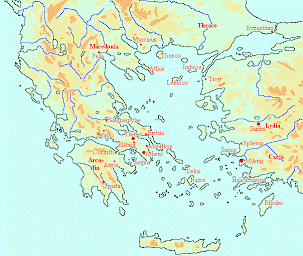Herodotus, bk 5, logos 15
Herodotus of Halicarnassus (c.480-c.429 BCE): Greek researcher, often called the world's first historian. In The Histories, he describes the expansion of the Achaemenid Empire under its kings Cyrus the Great, Cambyses, and Darius I the Great, culminating in Xerxes' expedition to Greece (480 BCE), which met with disaster in the naval engagement at Salamis and the battles at Plataea and Mycale. Herodotus' book also contains ethnographic descriptions of the peoples that the Persians have conquered, fairy tales, gossip, and legends.
Affairs in Athens (5.55-96)

The fifteenth logos is the logical sequel to the sixteenth. The Ionian ambassador Aristagoras of Miletus continues his visit to the towns of the Greek mainland and goes to Athens, which gives Herodotus a chance to devote a logos to the years in which the Athenian democracy was founded.
Athens had been ruled by a respected man named Pisistratus, but after his death his son Hippias had ruled the city like a despot. His brother had been murdered by two noblemen, and Hippias' rule had become oppressive. The noble Alcmeonid family had decided to remove the tyrant from Athens. After a failed first attack, one of them, a man named Cleisthenes, had bribed the priestess of the oracle at Delphi to tell the Spartans that it was their duty to liberate Athens.
A first Spartan expedition had met with disaster, because Hippias had known of the Spartan plans. This had been unacceptable to king Cleomenes, who had lead the second invasion in person. This time, the Spartans were successful, and Hippias had left Athens. He settled in Sigeum, a town near Troy at the Hellespont. But he was to come back, as we will see below.
Although Athens had been free, its troubles had not ended: rivalries between the noble families had taken their toll. Finally, Cleisthenes had been able to overcome his opponents by allowing every male citizen a vote in the people's assembly. At the same time, he had divided the population of Athens in new voting districts, situated across the territories of the old aristocratic families, and effectively breaking their power. This meant the establishment of democracy, not exactly what the Spartans had been fighting for. Twice Cleomenes had returned, but the free Athenians had been able to survive his invasions. The second of these had been well organized, and Athens had had to cope with invasions from all its neighbors (Thebes and Aegina); the Athenians had even sent an embassy to the Persian governor Artaphernes at Sardes to ask for help.
This logos ends with a story about a meeting at Corinth, where Cleomenes and his allies discussed the Athenian problem. Cleomenes proposed to restore Hippias, but Herodotus knows of a speech by the Corinthians, who showed the true nature of one-man-rule, and convinced the Spartans that their cause had become hopeless.
Comment
Pisistratus ruled Athens 546-527 BCE. From the Athenian historian Thucydides, we know that the murder of Hippias' brother, which took place in August 514 BCE, had no political motive.note
The first Spartan attack can be dated in 511; Cleomenes' invasion of Attica in the next year and the establishment of democracy in 509. The other two Spartan interventions were in 508 and 507.
We may notice that Artaphernes must have interpreted the Athenian embassy to Sardes as recognition of the great king's universal rule. When the Persian kings Darius I the Great and Xerxes accused the Athenians from perjury, they may have been right - from their own point of view. Their revenge was to come.